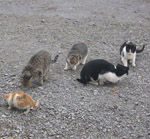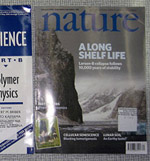Evidence vs. experience in protected area management
 Protected Areas
Protected Areas  U.S. Fish & Wildlife personnel conduct a prescribed burn in pine forest on the Upper Ouachita Refuge. Credit: Chris Foster, USFWSA new study from Australia confirms what we’ve known all along: adaptive management may be the gold standard for conservation practice, but it is certainly not the norm. Conservation practitioners are all too aware that they often have to make management decisions with less-than-ideal supporting information.
U.S. Fish & Wildlife personnel conduct a prescribed burn in pine forest on the Upper Ouachita Refuge. Credit: Chris Foster, USFWSA new study from Australia confirms what we’ve known all along: adaptive management may be the gold standard for conservation practice, but it is certainly not the norm. Conservation practitioners are all too aware that they often have to make management decisions with less-than-ideal supporting information.
The study confirmed this problem through a questionnaire survey of managers from 1065 protected areas spanning two agencies in Australia. The researchers wanted to find out whether practitioners use evidence-based information to support their management decisions or whether they rely on past experience. They define these opposing approaches along with an intermediate category:
Experience-based: Observational or experienced-based data gathered from past experience managing the reserve or personal communication with others.
Intermediate: Knowledge derived from plans, ad hoc monitoring and/or mapping.
Evidence-based: Knowledge derived from formal research, monitoring, and assessment (e.g. student research, site-level monitoring, grey and black literature)
The information supporting natural area management...
To determine where managers fall along this decision-making continuum, the researchers analyzed self-assessments in which conservation practitioners were asked to evaluate post-management success and to indicate what information supported their evaluation. The researchers analyzed these assessments based upon the assumption that information used to assess post-management success overlaps significantly with that used to support pre-implementation management decisions.
The study found that 90% of all assessments were made without any support of evidence-based knowledge. Judgments of success were based solely on experience 60% of the time and were based on "Intermediate" knowledge 30% of the time.
The researchers state,
"While the experience of practitioners should never be undervalued, the lack of evidence-based knowledge to support decision making is nevertheless worrying"
Another worrying issue, practitioners reported that they didn't have enough information to evaluate their management performance in 25% of assessments.
The researchers found that reserve size was related to the type of information available for assessing management outcomes. When evidence-based knowledge was available it was mostly for the large reserves (median of 1800 ha), which are also more likely to be national parks. Smaller reserves (median of 1200 ha), such as cultural heritage sites, tended to rely more on professional judgment and experience.
A continuing need for researchers, managers, and funders to work together...
Major environmental organizations and funders have spent the last decade developing systems of “conservation accounting” to measure success in biological terms, yet clearly a gap still exists between research science and natural area management - even in Australia, a relatively wealthy country. This finding bodes ill for conservation practitioners working in countries with fewer resources — some of the very places where many of the world’s biodiversity hotspots are located.
Natural area managers not only need to ask, but also to answer the question, “Are our efforts improving conservation values?” If sufficient data cannot be generated to answer this question, then well-intentioned conservationists may not only waste scarce funds but may inadvertently contribute to wildlife and ecosystem decline. As the authors of this study conclude,
“It is a false economy to protect natural areas while failing to adequately support the practitioners trying to manage them.”
--Reviewed by K. Gregg Elliott
| Source: | Frontiers in Ecology and the Environment |
| Title: | Conservation in the dark: the information used to support management decisions |
| Authors: | 1) Carly Cook, Mark Hockings, and 2) RW (Bill) Carter |
|
1) University of Queensland, Saint Lucia, Australia |




Reader Comments